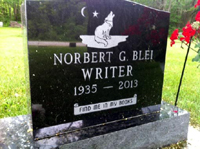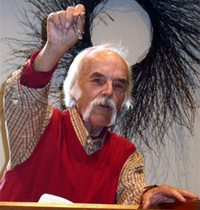
Poetry Dispatch No. 85 | July 3, 2006
Donald Hall by Norbert Blei
We have a new poet laureate, Donald Hall, a good poet, a good man, and an honor well deserved, considering the man’s lifespan and body of work.
I for one, however, will miss Ted Kooser, not all that old, and in many ways a poet more representative of the people and place (the plains, the Midwest) that gets so little recognition when it comes to honors as national in scope and meaningful to the world as America’s premier poet.
I’ve wanted to write about Kooser ever since he was designated poet laureate, but here he is, out of office already, and I am still thinking about what to say, still offering the usual “no-time” litany of self-defense. Initially, my impulse to come to his confirmation and defense stemmed from a smart-ass NYT Magazine interview I read. I still have that interview on file. And, I will get to it and him, eventually.
The one thing that saddens me most about Kooser leaving and Hall coming in as the new designated man of poetic me’tier is ‘location.’ It is so rare to have a poet of the plains, of the Midwest, (even the Southwest) receive the recognition he or she deserves, that there were some amongst the Eastern Establishment who took Kooser’s rise to such laurels as a joke. (Who is this hayseed from no-man’s-land? “Kooser?”S ounds like corn to me.” I better stop now before I get embroiled in a Kooser essay of love, depth, devotion I do not have the time or energy to deal with presently.
So, welcome Donald Hall. Spread the word wide, across the entire country. (As Kooser attempted to do by putting poetry back into some of our country’s newspapers.)
Here’s a New York Times editorial by Verlyn Klinkenborg (who lives and writes from New England—here we go again) that says something about the job, etc., but still leaves a lot unsaid.
Here also, in conclusion, is a favorite poem of mine by Donald Hall…which reaches across some of the culture barriers that exist and addresses the real work at hand for all if us–readers and poets. Norbert Blei

Donald Hall, Poet Laureate by Verlyn Klinkenborg
The question, What is poetry for? has a corol¬lary: What is everything that is not poetry for? That’s what I found myself wondering as I reread Donald Hall’s poem “The One Day” after hearing the good news that he will be the next poet laureate of the United States. The question has a circular, el¬liptical answer. In the life of a poet, what is not poet¬ry is for the making of poems. It is the raw stuff, like “a bad patch of middle-life,” as Mr. Hall puts it in his note on “The One Day.” It took 17 years to make that 60-page poem, and 17 years for a poem of that mag¬nitude is a decent rate of exchange.
In this country there is no job description for the poet laureate. And yet the title, which carries a stipend and a travel grant, is not entirely honorific. It’s assumed that the laureate will try to advance the cause of poetry — especially the public aware¬ness of poetry — in a manner somehow separate from the writing of poems. To speak on behalf of po¬etry sounds like a natural task for a poet, and for some poets it certainly is. I don’t know whether Donald Hall will turn out to be that kind of laureate, and, in a way, I hope he doesn’t. So much of his poetry has emerged from the rigor of his privacy — from what appears in his verse to be a deep, unsettling sense of what’s possible in one’s life. There’s always the temptation for the laureate to find some ano¬dyne ground to stand on. But these are not anodyne times.
To many readers, Donald Hall has lived what appears to be an eminently poetical life — in an an¬cient farmhouse in New Hampshire. The setting is pastoral, and yet there is a ferocity in Mr. Hall’s voice that undoes the pastoral, which is always wait¬ing to be undone. As Mr. Hall once wrote in an essay about the withering of the National Endowment for the Arts, “the mathematics of poetry’s formal reso¬lution does not preclude moral thought, or satisfac¬tion in honest naming, or the consolation of shared feeling.” I’m looking forward to the mathematics and the morality of this new laureate. After all, it doesn’t matter where you watch life from if your gaze takes in the whole world.

An Old Life by Donald Hall
Snow fell in the night.
At five-fifteen I woke to a bluish
mounded softness where
the Honda was. Cat fed and coffee made,
I broomed snow off the car
and drove to the Kearsarge Mini-Mart
before Amy opened
to yank my Globe out of the bundle.
Back, I set my cup of coffee
beside Jane, still half-asleep,
murmuring stuporous
thanks in the aquamarine morning.
Then I sat in my blue chair
with blueberry bagels and strong
black coffee reading news,
the obits, the comics, and the sports.
Carrying my cup twenty feet,
I sat myself at the desk
for this day’s lifelong
engagement with the one task and desire.
from The New Criterion (Jan. 1995)



























































Leave a comment